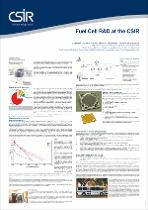JavaScript is disabled for your browser. Some features of this site may not work without it.
- ResearchSpace
- →
- Research Publications/Outputs
- →
- Conference Publications
- →
- View Item
| dc.contributor.author |
Hietkamp, S

|
|
| dc.contributor.author |
Masuku, C

|
|
| dc.contributor.author |
Mathe, Mahlanyane K

|
|
| dc.contributor.author |
Rohwer, Mark B

|
|
| dc.contributor.author |
Masombuka, T

|
|
| dc.contributor.author |
Benson, J

|
|
| dc.contributor.author |
Bosscha, Peter A

|
|
| dc.date.accessioned | 2008-12-10T12:43:57Z | |
| dc.date.available | 2008-12-10T12:43:57Z | |
| dc.date.issued | 2006-02 | |
| dc.identifier.citation | Hietkamp, S, Masuku, C, Mathe, M et al. 2006. Fuel cell R&D at the CSIR. CSIR Research and Innovation Conference: 1st CSIR Biennial Conference, CSIR International Convention Centre Pretoria, 26-27 February 2006, pp1 | en |
| dc.identifier.uri | http://hdl.handle.net/10204/2702 | |
| dc.description | CSIR Research and Innovation Conference: 1st CSIR Biennial Conference, CSIR International Convention Centre Pretoria, 26-27 February 2006 | en |
| dc.description.abstract | Increasing amount of funding is becoming available internationally to develop 'hydrogen economy'. The main drivers for countries to pursue this field are the need to create more energy independence and to address environmental issues. An important aspect of the hydrogen economy is the use of fuel cells, which is a device that converts chemical energy,for example hydrogen, directly into electrical energy, without the need to burn fuel to create the steam or gas that drives a generator. Functioning similarly to a battery, which uses electrochemical conversion, fuel cells take in hydrogen- rich fuel and oxygen and turn them into electricity and heat. The hydrogen used can be derived from gasoline, natural gas, propane or methanol. Within the CSIR and within South Africa's government and industry, it has been realised that research into fuel cells is important for South Africa for the same reasons as in other countries. In addition, since South Africa accounts for about 77% of the world's platinum supply and since platinum and other precious metals are an important part of fuels cells, South Africa could become a key player in a future hydrogen economy and fuel cell technology | en |
| dc.language.iso | en | en |
| dc.subject | Fuel cells | en |
| dc.subject | Chemical energy | en |
| dc.subject | South Africa | en |
| dc.subject | Electrochemical conversion-xbitm | en |
| dc.title | Fuel cell R&D at the CSIR | en |
| dc.type | Conference Presentation | en |
| dc.identifier.apacitation | Hietkamp, S., Masuku, C., Mathe, M. K., Rohwer, M. B., Masombuka, T., Benson, J., & Bosscha, P. A. (2006). Fuel cell R&D at the CSIR. http://hdl.handle.net/10204/2702 | en_ZA |
| dc.identifier.chicagocitation | Hietkamp, S, C Masuku, Mahlanyane K Mathe, Mark B Rohwer, T Masombuka, J Benson, and Peter A Bosscha. "Fuel cell R&D at the CSIR." (2006): http://hdl.handle.net/10204/2702 | en_ZA |
| dc.identifier.vancouvercitation | Hietkamp S, Masuku C, Mathe MK, Rohwer MB, Masombuka T, Benson J, et al, Fuel cell R&D at the CSIR; 2006. http://hdl.handle.net/10204/2702 . | en_ZA |
| dc.identifier.ris | TY - Conference Presentation AU - Hietkamp, S AU - Masuku, C AU - Mathe, Mahlanyane K AU - Rohwer, Mark B AU - Masombuka, T AU - Benson, J AU - Bosscha, Peter A AB - Increasing amount of funding is becoming available internationally to develop 'hydrogen economy'. The main drivers for countries to pursue this field are the need to create more energy independence and to address environmental issues. An important aspect of the hydrogen economy is the use of fuel cells, which is a device that converts chemical energy,for example hydrogen, directly into electrical energy, without the need to burn fuel to create the steam or gas that drives a generator. Functioning similarly to a battery, which uses electrochemical conversion, fuel cells take in hydrogen- rich fuel and oxygen and turn them into electricity and heat. The hydrogen used can be derived from gasoline, natural gas, propane or methanol. Within the CSIR and within South Africa's government and industry, it has been realised that research into fuel cells is important for South Africa for the same reasons as in other countries. In addition, since South Africa accounts for about 77% of the world's platinum supply and since platinum and other precious metals are an important part of fuels cells, South Africa could become a key player in a future hydrogen economy and fuel cell technology DA - 2006-02 DB - ResearchSpace DP - CSIR KW - Fuel cells KW - Chemical energy KW - South Africa KW - Electrochemical conversion-xbitm LK - https://researchspace.csir.co.za PY - 2006 T1 - Fuel cell R&D at the CSIR TI - Fuel cell R&D at the CSIR UR - http://hdl.handle.net/10204/2702 ER - | en_ZA |






